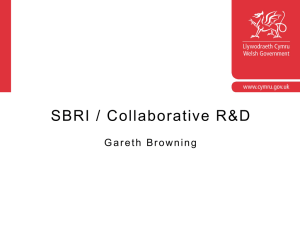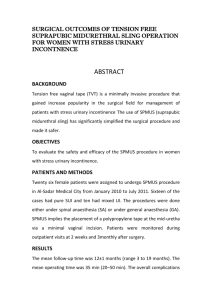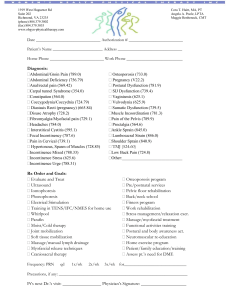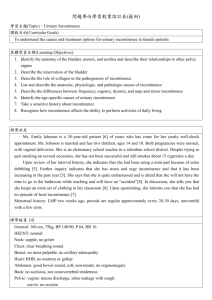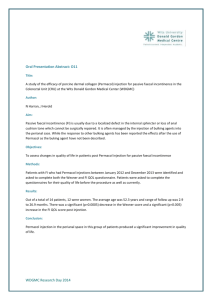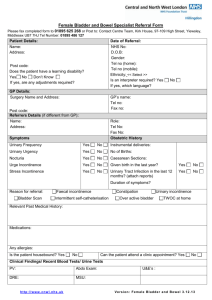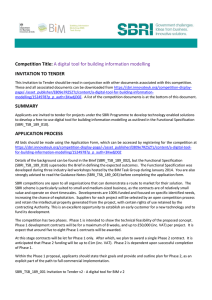NHS Midlands and East
advertisement
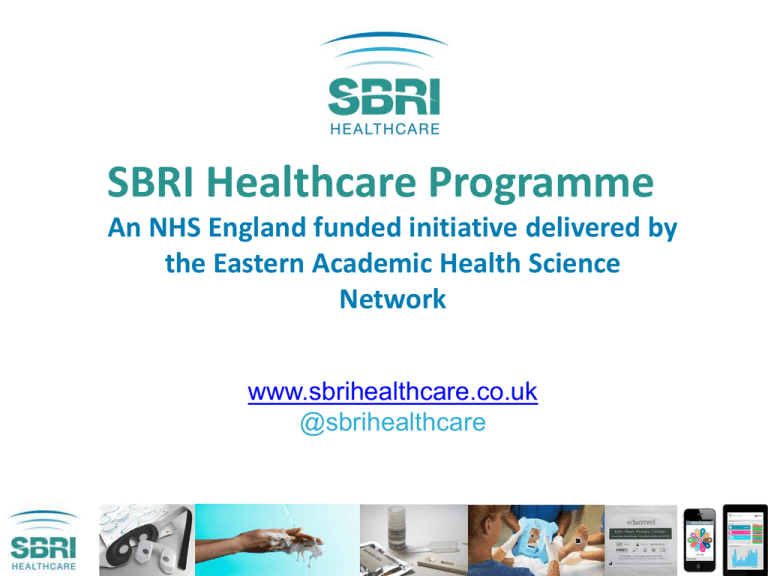
SBRI Healthcare Programme An NHS England funded initiative delivered by the Eastern Academic Health Science Network www.sbrihealthcare.co.uk @sbrihealthcare Agenda 18th June, Birmingham 13.45 Welcome from Chair Dr Christopher Parker, Managing Director, West Midlands Academic Health Science Network (WMAHSN) 13.55 Overview of the SBRI Healthcare Programme – Karen Livingstone, National Director, SBRI Healthcare 14.15 The application & assessment process – Nick Offer, SBRI Healthcare Project Manager, Health Enterprise East 14.35 Theme Presentations - focusing on: • Faecal and Urinary Incontinence • Functional Difficulties • Falls 15.35 Q&A session (All speakers) 16.00 Event close SBRI is a pan-government, structured process enabling the Public Sector to engage with innovative suppliers: Helping the Public Sector address challenges • Using innovation to achieve a step change Accelerating technology commercialisation • Providing a route to market Support and the development of Innovative companies • Providing a lead customer/R&D partner • Providing funding and credibility for fund raising SBRI Key features 100% funded R&D Operate under procurement rules rather than state aid rules UK implementation of EU Pre-Commercial Procurement Deliverable based rather than hours worked or costs incurred • Contract with Prime Supplier Who may choose to sub contract but remains accountable • IP rests with Supplier Certain usage rights with Public Sector – Companies encouraged to exploit IP • Light touch Reporting & payments quarterly & up front Things to Note • Any size of business is eligible • Other organisations are eligible as long as the route to market is demonstrated • All contract values quoted INCLUDE VAT • Applications assessed on Fair Market Value • Contract terms are non-negotiable • Single applicant (partners shown as sub contractors) • Applicants must fully complete the application form Eligible costs (all to include VAT) • • • • • • • Labour costs broken down by individual Material Costs (inc consumables specific to the project) Capital Equipment Costs Sub-contract costs Travel and subsistence Other costs specifically attributed to the project Indirect Costs: o General office and basic laboratory consumables o Library services/learning resources o Typing/secretarial o Finance, personnel, public relations and departmental services o Central and distributed computing o Cost of capital employed o Overheads www.innovateuk.org/sbri website contains details of all SBRI competitions The NHS Innovation Agenda 15 Academic Health Science Networks Created AHSNs Lead SBRI We will double our investment in the Small Business Research Initiative to develop innovative solutions to healthcare challenges, encourage greater competition in procurement of services, and drive growth in the UK SME sector SBRI Process AHSN led - typically undertaken by clinicians – service driven AHSN led Workshops with industry to support understanding PHASE 1: Typically 6 months – max of £100k PHASE 2: Typically 12 months – milestones agreed & monitored Problem Identification Open call to Industry Feasibility Testing development Pathway testing & Proof of Value Due diligence & contracts Assessment Prototype PHASE 3: Typically 12 months – milestones agreed & monitored New Competition Spring 2015 Minimising impact of falls Functional needs Urinary & faecal Continence Competition launch: 15 June 2015 Closing Date: Noon 11th August 2015 Industry workshops: 18th June, Birmingham; 25th June, London Contracts awarded: November 2015 Case study: The PolyPhotonix bio-photonic research and development company has developed a light therapy sleep mask costs £250 for 12 weeks’ treatment. • Diabetes is the most common cause of preventable adult blindness in the developed world. Treating it costs the NHS about £1bn a year. Currently treatment costs of as much as £10,000 per patient for each eye. • Trials have shown that eye disease can be reversed with significant results after as little as six months. Approximately 30 clinics around the country are trialling the product including Moorfields eye hospital. It is anticipated that Noctura 400 will receive NICE approval by the end of 2015. £1,458,158 awarded Estimated savings at £1 billion per annum Product available now 60 employees directly created as a result of SBRI funding. Approximately £2 million of additional investment has also been secured by the company. “There is no contest that I would choose the mask over the laser treatment. It is easy to use and removes any traumatic experience that occurred when having my eyes lasered.” Case Study: Fuel 3D Technologies Oxford University Spin out Company, Fuel 3D Technologies has devised a novel 3D camera which allows for improved monitoring and clinical intervention of chronic wounds in clinics, hospitals and in patient homes. • The Eykona Wound Measurement System, which was launched in the UK in December 2011 and is already being used in 20 NHS hospitals and primary care settings, allows community nurses to monitor the wounds while having the back-up of hospital-based experts. • Images can be evaluated without the need for patients to visit outpatients – increasing effectiveness and reducing costs. The technology allows wounds to be assessed by volume giving a more accurate picture of wound healing. £1,215,663 awarded £millions estimated savings 16 jobs created currently & £7m investment secured Product available: from 2012 “Our success in securing SBRI Healthcare support increased market awareness and helped to validate the Eykona Wound Measurement System. The SBRI funding also carried significant weight with the wider investment community and was instrumental in helping us achieve our funding objectives,” Stuart Mead, Chief Executive, Fuel3D Case study: Advanced Digital Institute Pathways through Chronic Pain is being developed as a cost-effective Cognitive Behavioural Therapy (CBT)-based pain management programme without the need for direct involvement by a therapist or clinician. • An estimated 5.3 million people suffer from chronic pain in England which has a major impact on sufferers’ lives, with 24% reporting a diagnosis of depression and 26% reporting an impact on employment. • Self-help digital products to support people with chronic pain. The technology will enable both patient and practitioner to have a balanced step-wise process to self-assess, self-manage, and self-monitor changes in pain. £885,970.00 awarded Estimated savings to NHS at £20 million per annum 4 jobs created currently Product available: summer 2015 Accelerating “One of things I really loved about it was that I got quite poorly for a few days and I started struggling with my activity goals, and kept recording ‘I struggled, I struggled’. After a couple of times the app flashed up and said ‘are you sure this goal isn’t too high for you – do you want to adjust your goal’. I thought this is brilliant and so I changed it and started meeting it again and that was so much better than keeping failing.” The emerging picture? Size large 7 medium 5 small 26 micro 54 0 20 40 60 Status > 10 years 16 5-10 years 13 1-5 years 23 start up 14 0 10 20 30 Turnover >£10m £1-£10m £250-£1m £100-250k <£100k 8 20 16 29 28 0 10 20 30 40 Scotland & N Ireland Radisens, Edixomed, AHSN/SBRI companies Grter Manchester & NW Coast - Sky Med, TrusTECH West Midlands SensST Systems, Just Checking Ltd West of England SentiProfiling, My mHealth Wessex CreoMedical, Morgan Automation South West Frazer Nash North East & North Cumbria Polyphotonix Ltd Yorks & Humber Halliday James Ltd East Midlands Monica Healthcare Ltd Oxford Eykona, Oxford Biosignals, Message Dynamics Eastern Aseptika, Bespak, TwistDX S.London, Imperial, UCLP ABMS, Pintrack, Therakind, uMotif Kent, Surrey & Sussex Anaxsys, InMezzo The application process Nick Offer SBRI Healthcare Programme Manager sbrienquiries@hee.co.uk 01223 598425 www.sbrihealthcare.co.uk @sbrihealthcare Application Process www.sbrihealthcare.co.uk Application Process Assessment Phase Timelines • Close competition, noon on 11th August • Review compliance (August) • Assessment packs assigned and issued to Technical Assessors (August) • Each application reviewed & scored by 3 Technical Assessors (Sept) • Assessment of long-list applications at panel meeting involving clinical leads (Sept) • Production of rank ordered list for interview (Sept) • Interview panels to select final winners (Oct) • Draft and issue contracts (Nov) • Publish contracts awarded (Dec) • Feedback to unsuccessful applicants (Jan) Assessment Criteria 1. What will be the effect of this proposal on the challenge addressed? 2. What is the degree of technical challenge? How innovative is the project? 3. Will the technology have a competitive advantage over existing/alternate technologies that can meet the market needs? 4. Are the milestones and project plan appropriate? 5. Is the proposed development plan a sound approach? 6. Does the proposed project have an appropriate commercialisation plan and does the size of the market justify the investment? 7. Does the company appear to have the right skills and experience to deliver the intended benefits? 8. Does the proposal look sensible financially? Is the overall budget realistic and justified in terms of the aims and methods proposed? Key Points to Remember • • • • • • • Research and define the market/patient need Review the direct competitor landscape and make sure you define your USP Consider your route to market, what is the commercialisation plan? Do you know who your customer will be, how will you distribute, how much will you charge for the product/service? How will the project be managed (what tools will you use, how will the team communicate etc) Provide a clear cost breakdown Make sure you answer all of the questions in sufficient detail Try not to use too much technical jargon, sell the project in terms the NHS will understand (outcomes, benefits to patients etc) Contact Us Karen Livingstone SBRI Healthcare National Director karen.livingstone@eahsn.org 01223 257271 Nick Offer SBRI Healthcare Programme Manager sbrienquiries@hee.co.uk 01223 598425 www.sbrihealthcare.co.uk @sbrihealthcare Multi-morbidities Faecal and urinary incontinence in frail elderly people Faecal incontinence is the inability to control the passage of faeces through the anus Urinary incontinence is the involuntary loss of urine • Incontinence is a set of symptoms not a disease • Can have either FI and UI or both • There is often an underlying cause that can be treated • In some cases early treatment can prevent incontinence later in life or reduce symptoms • It is very common, and more common in older people, but need not be a consequence of ageing • At least 1 in 3 older people in nursing homes have incontinence • It is often present with other conditions, especially in the elderly • Treatments for other co-morbidities can result in incontinence • Many older people have cognitive impairment and this is a risk factor for incontinence • Continence management is what we offer frail elderly people – usually pads or indwelling catheters • Balance between independence and care by others Aims • To give older people a sense of dignity and control and enhance quality of life • To reduce incontinence in our elderly population Challenge 1: Prevention What if we could break down the taboo surrounding incontinence by informing and educating people of all ages into the causes and how to prevent incontinence? What if we can identify and monitor individuals who are at risk? Challenge 2: Diagnosis What if we could accurately diagnose and treat all individuals with faecal or urinary incontinence? Challenge 3: Treatment What if we could have cost-effective, reliable, long-lasting, easy to use, minimally invasive, biocompatible and safe treatments suitable for older people? Challenge 4: Management What if we can offer personalised continence management that offers patient dignity and minimises the effects of social stigma? Frank Edith Additional resources: • http://www.slideshare.net/raheef/urinaryincontinence-48218342 • http://www.icud.info/incontinence.html 30 minute surgeries (phone or face-to-face) for applicants with continence clinical specialists to be held w/c 13 July in Bristol. Booking essential. Contact: christine.sidenko@weahsn.net
